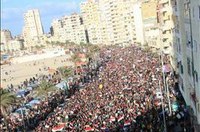 These are the conclusions of Moneef R. Zou'bi, director general of the Islamic World Academy of Sciences, and Daniel Schaffer, public information officer of TWAS, in an article published in the most recent edition of the 'TWAS Newsletter'.
These are the conclusions of Moneef R. Zou'bi, director general of the Islamic World Academy of Sciences, and Daniel Schaffer, public information officer of TWAS, in an article published in the most recent edition of the 'TWAS Newsletter'.
The Arab Spring, which began a year ago, has upended many of the prevailing assumptions about the region. At the same time, it has made it virtually impossible to predict what the future will hold for science and society. As Zou'bi and Schaffer observe, "the events that followed the Arab Spring have revealed how difficult it is to view the region as one – despite its shared heritage and the common set of challenges that it faces."
Before the Arab Spring, they say, "a growing number of countries in the region were taking significant steps to improve their scientific capacity." High-profile projects included the launch of the King Abdul-Aziz University of Science and Technology (KAUST) in Saudi Arabia, Education City in Qatar, and Masdar City in Abu Dhabi. They also cite the extensive investments in science and technology made by the Qatar Foundation, the Rashid Al Marktoum Foundation and other funding agencies, as well as government-sponsored programmes for the development of renewable energy in Morocco and nanotechnology in Egypt.
"Many of these initiatives", note Zou'bi and Schaffer, "will undoubtedly continue in the aftermath of the dramatic events that have taken place this year – and some may even be expanded."
Yet, as they also note, "these efforts have taken place against a backdrop of significant shortcomings and challenges" that helped to set the stage for the protests that spurred the Arab Spring.
For example, the region, on average, spends less than 0.4% of its gross domestic product on research and development. The global average is 1.7%. Countries throughout the Arab region average just over 400 researchers per one million population. The global average is more than 1,500 researchers. While the number of articles published in international peer-reviewed journals by scientists in the Arab region has more than doubled over the past decade, the number of scientific articles published per million population remains one-third the global average. Only one Arab scientist, Boudjema Samraoui, a biologist at the University of Annaba in Algeria, is included on the list of the most cited scientists compiled by Thomas Reuters (formerly ISI) Web of Knowledge.
In short, Zou'bi and Schaffer caution that the "progress the Arab region has made in strengthening its scientific and technological capacity rests on as a weak foundation" and that "given the tumultuous events that have taken place within the region over the past year, there is no guarantee that these advances will continue."
Yet, they state that "the Arab Spring holds great promise for both science and society."
"If the democratic impulses that drove the protests in the first place can guide the principles of reform that are now taking shape", they believe that "science will surely benefit".
"Successful societies built upon abiding respect for evidence and excellence", they assert, "are also societies in which science flourishes. Societal and scientific progress", they add, "tend to go hand-in-hand in a virtuous cycle of success."
To take advantage of the historic opportunities afforded by the Arab Spring, Zou'bi and Schaffer say that countries throughout the region "must devise effective strategies for getting from here to there and must do so as quickly as possible. Calling on people to be patient in the face of dramatic changes is one thing" they state. "Expecting them to be patient is quite another, especially if the economy stalls and conditions do not improve."
At the same, the authors argue that Arab countries must broaden the scope of national security to encompass water, food and energy security, as well as the ability of people to secure jobs that recognize and reward their skills and education.
"Security", they maintain, "is not simply a matter of protecting the population from enemies, however vital to national well-being that may be. It also includes protecting people from material want and ensuring that people have access to the basic building blocks needed to construct a life defined by well-being and opportunity."
Zou'bi and Schaffer say that "there is no question that science can benefit from the Arab Spring" – or that countries throughout the region, in turn, can benefit from strong and active scientific communities. But they conclude that such mutually beneficial developments will only occur "if the Arab Spring fulfils its promise to transform society in ways that past regimes did not."
Find the full TWAS Newsletter article below.

